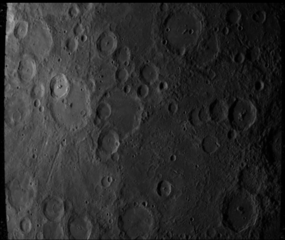Kuiper (Mercurian Crater)
Kuiper is a moderate-size crater with a central peak cluster located at 11°21′S 31°14′W / 11.35°S 31.23°W on Mercury. It is 62 kilometers in diameter and was named after Dutch-American astronomer Gerard Kuiper in 1976. It is one of only 2 Mercurian craters which are named not after artists, and one of very few cases when the same name is used for 3 craters (there are also Kuiper craters on Mars and on the Moon). Gerard Kuiper, being a leader of American planetary science, died shortly before the first images of Mercurian surface were made.
Kuiper overlies the northern rim of the larger crater Murasaki. Kuiper crater has the highest recorded albedo of any region on the planet's surface and has a prominent ray system, suggesting that it is one of the youngest craters.
Kuiper is one of the largest craters of the Kuiperian system on Mercury. The largest is Bartók crater. The Kuiperian time period is named after Kuiper crater.
Views
-
Mariner 10 image with Kuiper at left
-
Distant oblique view from MESSENGER showing the extent of the ray system
-
Kuiper crater at low sun angle
-
Oblique view at high sun angle
References
- ^ "Kuiper". Gazetteer of Planetary Nomenclature. USGS Astrogeology Research Program.
- ^ Morrison D. (1976). "IAU nomenclature for topographic features on Mercury". Icarus. 28 (4): 605–606. Bibcode:1976Icar...28..605M. doi:10.1016/0019-1035(76)90134-2.
- ^ De Hon, R.A.; D.H. Scott & J.R. Underwood, Jr. (1981). "Geologic Map of the Kuiper (H-6) Quadrangle of Mercury". (Description)
- ^ Denevi, B. W., Ernst, C. M., Prockter, L. M., and Robinson, M. S., 2018. The Geologic History of Mercury. In Mercury: The View After MESSENGER edited by Sean C. Solomon, Larry R. Nittler, and Brian J. Anderson. Cambridge Planetary Science. Chapter 6, Table 6.4.
Links



